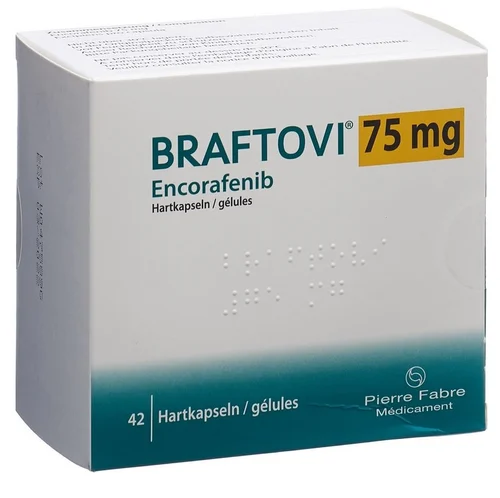AVAILABLE MEDICINE FOR Search By Molecule
| Image | Name | Price | Action |
|---|---|---|---|

|
Braftovi Encorafenib 75 Mg Capsules
|
|
Ask for Price |
Introduction to Encorafenib
Encorafenib is a targeted therapy drug that belongs to a class of medications known as BRAF inhibitors. It is primarily used in the treatment of cancers with mutations in the BRAF gene, particularly melanoma, a type of skin cancer. By specifically targeting the BRAF V600E mutation, encorafenib inhibits the abnormal activity of the BRAF protein that contributes to cancer cell growth. The drug works by blocking the signaling pathway responsible for tumor growth, helping to slow down or stop the progression of the disease.
Mechanism of Action
Encorafenib is an oral small-molecule inhibitor of the BRAF V600E mutation, which is a common mutation in several cancers, including melanoma, colorectal cancer, and non-small cell lung cancer. The BRAF gene produces the BRAF protein, a kinase that plays a crucial role in the MAPK/ERK signaling pathway. This pathway is involved in regulating cell growth, survival, and differentiation.
In patients with the BRAF V600E mutation, the BRAF protein becomes permanently activated, leading to uncontrolled cell division and cancer growth. Encorafenib binds to the mutant BRAF protein, inhibiting its enzymatic activity and preventing the subsequent activation of the MAPK/ERK pathway. As a result, the growth and survival of cancer cells are significantly reduced, and tumor progression is slowed.
Encorafenib is used in combination with other therapies to enhance its efficacy, particularly in patients with advanced melanoma or other cancers harboring the BRAF V600E mutation. It is often combined with other targeted therapies, such as binimetinib, an MEK inhibitor, to provide a more comprehensive approach to blocking the tumor growth pathways.
Uses of encorafenib
Encorafenib is primarily approved for the treatment of metastatic melanoma with a BRAF V600E or V600K mutation. This is a type of skin cancer that has spread to other parts of the body. The drug is often used in combination with binimetinib, another targeted therapy, to improve outcomes for patients with advanced melanoma. The combination of encorafenib and binimetinib has shown significant improvements in progression-free survival and overall survival in clinical trials.
In addition to melanoma, encorafenib is also approved for use in treating other cancers with the BRAF V600E mutation, such as:
- Metastatic Colorectal Cancer: Encorafenib is used in combination with cetuximab for patients with metastatic colorectal cancer who have a BRAF V600E mutation and have not responded to prior therapies.
- Non-Small Cell Lung Cancer: Encorafenib is also being investigated for use in NSCLC patients with BRAF V600E mutations, although it is not yet widely approved for this indication.
FDA Approval and Clinical Trials
Encorafenib was approved by the U.S. Food and Drug Administration in 2018 under the trade name Braftovi. Its approval was based on the results of several clinical trials that demonstrated the drug’s efficacy in treating BRAF V600E-mutant melanoma. The most significant of these trials was the COLUMBUS trial, which evaluated the combination of encorafenib and binimetinib in patients with advanced melanoma.
The COLUMBUS trial showed that the combination of encorafenib and binimetinib significantly improved progression-free survival (PFS) and overall survival (OS) compared to encorafenib alone or dacarbazine chemotherapy. The combination therapy also demonstrated a higher response rate, making it an important treatment option for patients with advanced melanoma.
In addition to melanoma, encorafenib has shown promise in clinical trials for other cancers with BRAF V600E mutations, including colorectal cancer and NSCLC. The results of these trials are still being evaluated, but the initial findings suggest that encorafenib may be an effective treatment option for a variety of cancers driven by the BRAF V600E mutation.
Dosage and Administration
Encorafenib is typically administered as an oral tablet. The recommended dosage is 450 mg once daily, taken with or without food. It is important for patients to follow their doctor’s instructions regarding dosing, as the dosage may be adjusted based on individual tolerance and response to the drug. If a dose is missed, it should be taken as soon as possible unless it is almost time for the next dose.
Encorafenib should be used in combination with binimetinib for the treatment of metastatic melanoma. In this combination, binimetinib is usually taken at a 45 mg dose twice daily. The combination of encorafenib and binimetinib has shown significant clinical benefits, including extended progression-free survival and improved overall survival.
Patients are typically monitored during treatment with encorafenib to assess for potential side effects and ensure the drug is working effectively. Regular visits to the healthcare provider are necessary to track the patient's progress.
Side Effects
Like many cancer therapies, encorafenib may cause side effects.
- Fatigue
- Skin Rash
- Diarrhea
- Nausea and Vomiting
- Fever
- Liver Enzyme Elevation
Serious side effects
- Heart Issues
- Severe Skin Reactions
Drug Interactions
Encorafenib can interact with other medications, so it is important to inform healthcare providers about all other medications being taken, including over-the-counter drugs and supplements. Some drugs may interfere with the effectiveness of encorafenib, while others may increase the risk of side effects.
- Strong CYP3A4 Inhibitors
- CYP3A4 Inducers
- Warfarin
Conclusion
Encorafenib is a potent BRAF inhibitor that offers a promising treatment option for patients with cancers harboring the BRAF V600E mutation, especially melanoma, colorectal cancer, and NSCLC. With its targeted action against the BRAF mutation, encorafenib provides an effective therapy for patients whose cancer is driven by this specific genetic alteration. When used in combination with other therapies such as binimetinib, encorafenib has shown significant improvements in survival outcomes.
As with any cancer therapy, the use of encorafenib requires careful monitoring for side effects and potential drug interactions. Its FDA approval and the positive results from clinical trials highlight its value in the oncology treatment landscape. Patients with BRAF V600E-mutant cancers should discuss the potential benefits and risks of encorafenib with their oncologists to determine if this targeted therapy is the right choice for their treatment plan.


